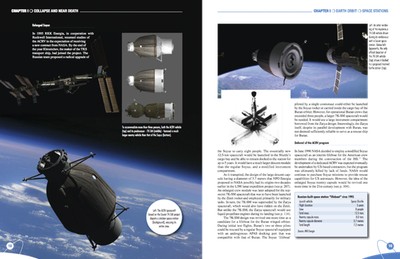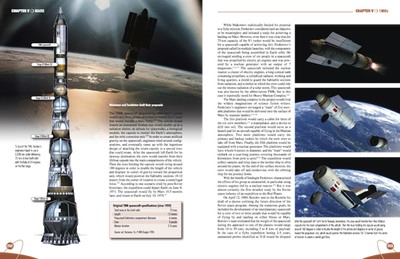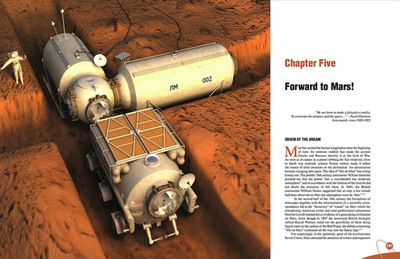Russian on Space: an interview with Anatoly Zakby Dwayne Day
|
| I soon realized that the real Soviet space program was top secret and any knowledge about the American effort was discouraged. Obviously, this was a great way to ignite anybody’s interest. |
AZ: It is a visual history of Russian plans in human space flight aiming to reach three major destinations: space stations in low Earth orbit, an expedition to Mars, and a permanent lunar base. The book focuses on the post-Soviet period, however it does describe and illustrate historic roots for these three major “roadmaps” in space flight as far back as the 1950s, as well as sets a political stage in which these projects were conceived and implemented (or not implemented).
DD: When did you decide you wanted to write a book about this subject?
AZ: I started working on it at the end of 2009, when I first had an opportunity to do such a complex and expensive project. However, the book incorporates my illustrative work from around 2004 and journalistic research dating back as far as 1993.
DD: Is there a particular era or subject that really interests you?
AZ: (If the question is about space) I am obviously interested in space history as a whole, but I really like to “write history as it happens,” meaning most recent developments. That said, the early history of the Space Age, at the beginning of the 20th century and the 1930s and the 1940s is really fascinating.
DD: What is your background? When did you create your website?
AZ: I have a mass communications degree from Syracuse University. I also spent three years at Journalism School of Moscow State University. RussianSpaceWeb.com has been in development since 1995 and its early version came online in 1998.
DD: Where do you get your information? Is all of your information taken from open sources in Russia, or do you know people who tell you the inside story on what is going on?
AZ: It is a combination of open sources and internal documents sent to me by industry insiders, who believe that it would help to preserve the history of engineering thought, since many internal papers and designs for unfinished and unrealized projects are often destroyed.
 |
DD: Have you tried doing any archival history research in Russia? Is that possible?
AZ: Yes, I did, but it turned out to be very expensive and practically impossible without academic or corporate support. I still hope to do it some day.
DD: Your book and your website include a lot of great graphics. How did you learn graphic design and illustration?
AZ: I was interested in art since childhood, but I first learned computer graphics at Syracuse in the mid-1990s. Surprisingly, they required all newspaper and magazine majors to take computer graphics and design classes. We were grumbling, but I now suspect there was a good reason they were doing it to us!
DD: I’ve always thought that you had some great interactive illustrations on your website, such as the graphics of things like the Soyuz where someone can slide a cursor over the vehicle and the labels appear. What are your views about print versus an ebook?
AZ: It seems to me that the jury is still out on the future of ebooks. If we are talking about true multimedia ebooks with interactive graphics, 3D animations and video, they might be quite expensive to produce, therefore it is important to prove their economic feasibility.
DD: Where did you grow up? How were you influenced to get involved in writing about spaceflight?
AZ: I grew up in Moscow. I had a pretty normal childhood with school, sports, and friends. My father spoke five languages and had a big library with books on pretty much every subject. I spent some time reading about Roman and medieval history, geography, and politics. But I also stumbled on his astronomy books and still remember my fascination when reading Camille Flammarion’s Popular Astronomy. With friends, I went to the Moscow Planetarium and to the Kosmos exhibit. I soon realized that the real Soviet space program was top secret and any knowledge about the American effort was discouraged. Obviously, this was a great way to ignite anybody’s interest. At age 17, I wrote a detailed history of the US Space Shuttle program, which was eventually published as a magazine series with the arrival of Gorbachev’s “perestroika.”
DD: I once attended a space conference in what used to be East Germany and discovered that the people who grew up there idolized the early Soviet cosmonauts, many of whom I was unfamiliar with. Who were your heroes and what were your influences when it comes to space?
AZ: We were growing up way too late to remember first cosmonauts. Gagarin was already dead and Tereshkova was an active Communist Party official. It did not look good. My parents were very cynical about the authorities and saw cosmonauts as an elite living in an ivory tower insulated from problems ordinary people were facing. However, I did have huge respect for Korolev and his associates. I also admired Galileo and Copernicus and saw their lives and tribulations as much more relevant to what was going on in the USSR than repetitious and sterilized biographies of contemporary cosmonauts coming out of the official press.
| I am especially interested in rockets, because, they are seemingly the most awesome machines ever created by human genius, but, ironically, also the main problem of space exploration. |
With my luck, right after high school, I conveniently ended up at the Teikovo strategic missile division as a conscript soldier. I saw things that would make Full Metal Jacket look mild, and like any good adventure story, it culminated with a disaster. After the army, I went to journalism school at Moscow State and as a part-time newspaper reporter witnessed the collapse of the Soviet space program, along with the rest of the USSR. I spent that fateful night on August 19, 1991, in front of the Russian parliament building. Like most revolutions, it started with a great hope but quickly turned into a bloody farce. I came to the US in 1993.
DD: Was that a difficult transition for you?
AZ: You bet. It still is.
 |
DD: When you came to the United States, did you want to go see the space sites? Did you get to Kennedy Space Center and see a shuttle launch?
AZ: Not right away, but I did come to the Cape as a journalist. It was a nearly religious experience: NASA took us inside VAB and they also drove us to the edge of Pad 39 as the Atlantis was being prepared for launch.
DD: What space subjects interest you the most and why?
AZ: I am especially interested in rockets, because, they are seemingly the most awesome machines ever created by human genius, but, ironically, also the main problem of space exploration. I had so much hope for the Space Shuttle and it broke all promises so spectacularly. It is a Hindenburg of our time.
DD: Are there any space subjects that you would really like to know more about but find it difficult or impossible to get information about them?
AZ: The military space program is, of course, a mystery. I try to follow as much as I can. It is very interesting to see documents and images on the Cold War-era missions emerging piece by piece on both sides. Also, we obviously know very little about the real Chinese, North Korean, and Iranian space program, behind the official theater. I hope to live long enough to see all these three regimes inevitably collapse and learn their real history, as it happened with the USSR 20 years ago.
DD: Which space subject are you most interested in right now?
AZ: I am very interested to see whether the modern manned space program could truly find its way and place in society in the Post-Cold War era. What I see so far is not really encouraging but there is hope.
DD: You recently appeared on The Space Show where you discussed the plans to use Mir commercially. What is your view of this effort in the late 1990s?
AZ: It is was a daring effort and a huge PR stunt, but far ahead of its time and financially unsustainable. It was also politically humiliating for Russia.
DD: Why do you think it was unsustainable?
AZ: Because we have an idea what it costs to operate the manned space station and we don’t have a slightest idea how to recover such expenses.
DD: Why do you think it was “humiliating” for Russia?
AZ: I guess for the same reason a Japanese takeover of the Rockefeller Center looked humiliating to the Americans. The Russian society considered Mir as a national treasure and a source of national pride, so it was obviously painful to see it under a financial duress, rented out to millionaires from overseas.
DD: True, when a Japanese real estate firm bought Rockefeller Center in late 1989 it was widely viewed as symbolic of America in decline and Japan in ascendancy. But a short time later the Japanese economic bubble burst and the Cold War ended. I think it demonstrates that often events can be symbolic but the reality is much different.
AZ: Absolutely! The Russian space program saw a remarkable and unexpected reversal of fortune. However, they still have a very long way to go and today’s mismanagement and corruption spoils things. It is a very mixed picture and I try to reflect this in the book.
DD: What do you do for fun?
AZ: I love my racing bike and I am an avid skier. I love driving and traveled all over the US and across Europe. I love history, politics, comedy, and Woody Allen’s movies.
DD: Any other publications or books planned?
AZ: Yes, I gathered a great deal of material for the second book and conceptualized the third, but I still have work to do with the research and graphics. So, I might need a few years.
DD: I admire your ambition. Writing a book is a lot of work, although I have also found that it is possible to reach a point where it becomes enjoyable, where you reach a plateau because you feel like you have mastered the subject. What is your second book about?
AZ: I hope to do a prequel of sorts to the first book and cover more than manned space. Many interesting materials on the early space program came my way and I am trying to figure out economics of putting it together. I am also continuing with the latest developments in Russia and put much data and imagery on RussianSpaceWeb.com. Depending on the future of the book industry, I hope eventually turn it into a book, ebook, or whatever other medium emerges in the following decade.
